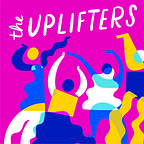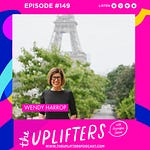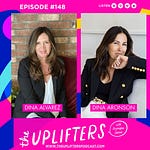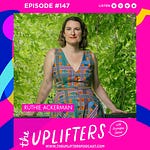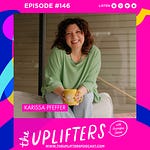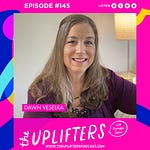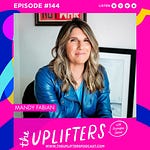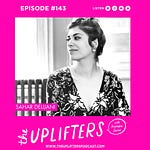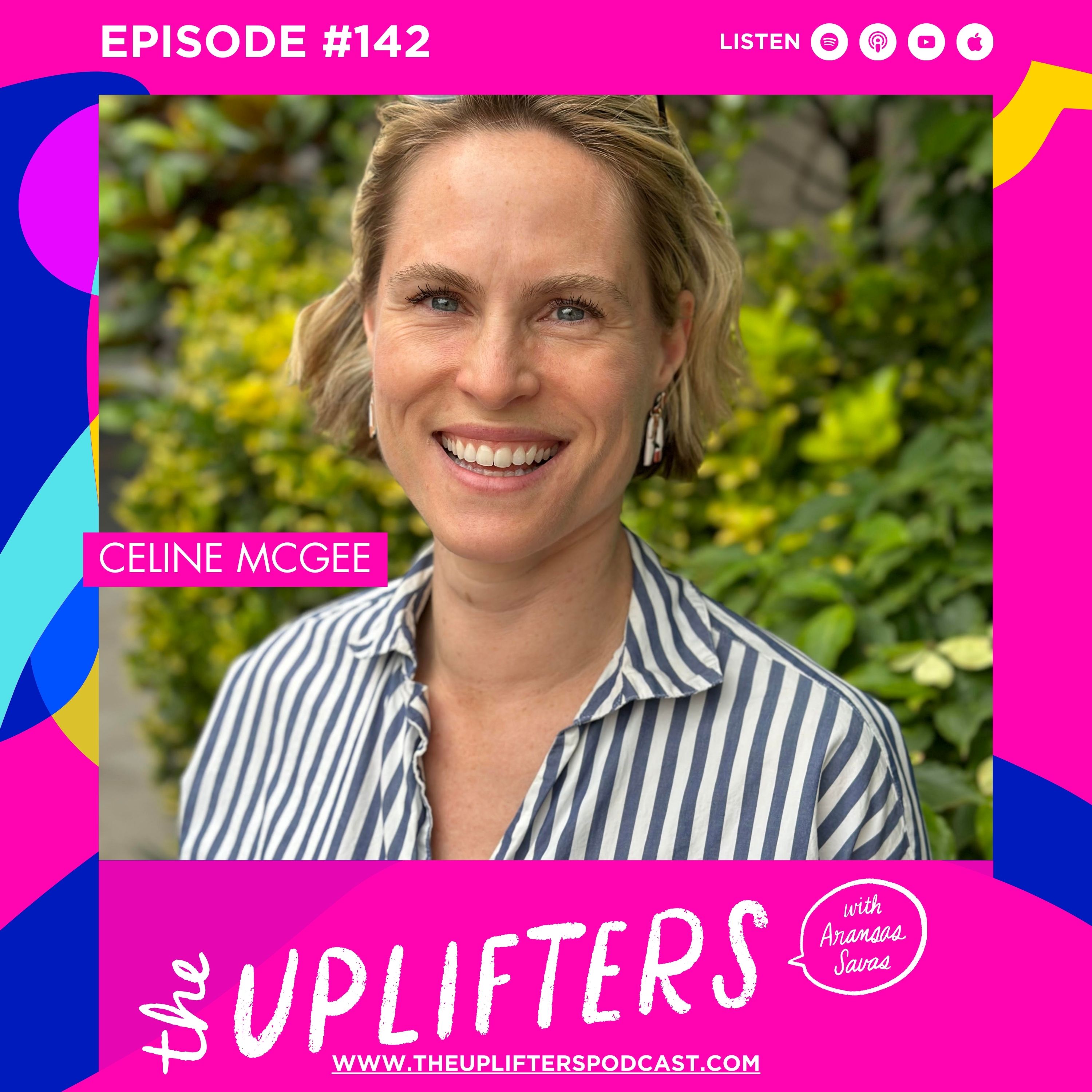Welcome to The Uplifters Podcast!
You can listen to our latest episode in the player here or on Apple Podcasts, Spotify, or wherever you get your podcasts. Watch us on YouTube.
Our guest today is Rachel Lipson, the founder of Blue Balloon Songwriting School, who has been called the “Matriarch of Modern Music Education.”
Rachel shares her journey from leaving a steady and secure full-time job as a school teacher to pursuing the uncertain path of teaching songwriting to children and creating her own business - a company that has since grown into a network of 75+ independent instructors, teaching over 400 students a week on many different instruments all over the world.
You’ll hear Rachel share what it took to lean into the unknown and how she keeps going despite her fears, anxiety, and limiting beliefs.
Rachel says, “I thought, “This is a great idea, but not for me. I mean, who am I? Why should I do this? Somebody's better at guitar than me. Somebody's a better songwriter. Somebody knows more people, and has more money, more connections, and more resources. There's a mile-long list of things that could make me think I'm the wrong person to do this. And then I thought, ‘OK, well, there's not a line of people saying, ‘Rachel, if you don't wanna do it, step aside and I'll do it.’ I think a lot of women feel this way… they look in the mirror and say, who am I to have started this? Who am I to do this? But if you don't do it, it may never happen.”
Rachel helps us understand how to thrive despite our fears and anxiety.
She also shares:
Why letting others in on the secret of your dreams can help you, financially, emotionally, and more.
Tips on creating physical spaces that cheer us on when we need a boost
Ways to stockpile evidence of our success to sustain us
The biggest hurdles she hears from the entrepreneurs she coaches.
If you're an entrepreneur or considering starting your own business, this episode is for you! If your mindset or confidence has ever stalled your progress, Rachel's story is inspiring and full of practical tips that you can apply to your own journey!
After you listen, join Rachel and me and a host of other uplifting women over at Live Up Daily to continue the conversation. And uplifting is contagious, so if you find value in this episode, please leave us a review and share this episode with your friends and colleagues who might benefit from Rachel's story and spread the love.
With lots of love and moxie,
Aransas
A Messy Transcript of This Episode, for those who prefer to read it.
Aransas Savas:
So tell me your story in a nutshell. I feel like there's so much I don't know about you yet. And maybe that'll help us all kind of ground in who you are and how you do what you do.
Rachel Lipson:
Sure. Well, my story. Well, I was, you know, around the time when we met, I was a teacher and, you know, trying, I probably had, I think at that time, three or four jobs. I was a waitress, I was a teacher in a classroom, I was teaching after school. I mean, I was really doing the whole, you know, 20-something New York City hustle to try to pay my rent and make it work. And, you know, really found My favorite part of the day was teaching music lessons to kids. And so that was how I originally kind of started my business, not even knowing I was starting a business. I just thought, you know, here's a way to make some extra money, something I really enjoy. And as time went on, that, you know, turned into more than my full-time job. I was going from a full-time job to teaching a whole bunch of music lessons. And at one point I remember thinking, to choose, I cannot sustain this. And I thought, you know, I probably did it for much longer than I should have, doing both things. You know, really like superhuman kind of moments where you're thinking, how could I possibly wake up tomorrow and work all of these jobs? And I would do it, and I loved it. But I knew that in the future I wanted to have a family and I wanted to have some time to myself. And so I had to choose and I chose to start my own business. And, So that was kind of the beginning of Blue Balloon.
Aransas Savas:
And so you had at that time, you had a full-time job, you had a salary, you had all the comforts that come with that security. And that's really valuable to people in terms of psychological safety and comfort. How did you muster the courage to let go of that comfort and shift into something that, even though it sounds like it was providing you lots of personal satisfaction on in terms of understanding the need and the potential there. How did you lean into the unknown?
Rachel Lipson:
Well, I mean, that was really challenging, obviously. It was not. It was a lot of the conversations with myself and conversations with other people about how I can look at what I really want ultimately and figure out what I need to do to get there, even if it's scary, which is
Aransas Savas:
Mm-hmm.
Rachel Lipson:
something I have a lot of experience with. So that was, so that was difficult because you're right, having all that security and knowing that I had a paycheck. Now, health insurance is a big one. daughter of two public school educators. I had great insurance my whole life. I never had a moment without, you know, amazing health insurance, which I feel so fortunate about. And then there I was in my 20s about to lose, you know, that coverage from what I had had from my parents and you have from your job and those things that do make you feel protected and safe. And actually what I ended up doing was I started, I started a Kickstarter. Kickstarter was like early go fund me and it was like the very beginning of Kickstarter I mean, I don't remember when they were actually founded but it was early Kickstarter and I founded and I, and I said I'm founding this songwriting school and Asked people to give and at that time no one knew what Kickstarter was even this idea I had to one sell them on my music school But also to sell them on like donating the Kickstarter like why would anybody do that? No one even knew it is it safe to put your credit card information into this platform nobody knew. And what I ended up doing, I raised a few thousand dollars, which was amazing. And it was at that time, I mean, I was young. I, that, that money really went to my health insurance. And that was actually interesting because you think of starting a business and you think of the expenses. And I think a lot of people would think, oh, I need, I need to figure out how I'm going to get an office space. Maybe not now post COVID, but you know, some of the things that at that time you would think that's what makes your business a business. space. There's just so many things that people think of that make them feel like they've really done it and they've pulled the trigger and the business is real. But for me, I was operating under very low overhead. I really didn't have an office space. I worked from home. I always liked to work from home when I was doing that business-y kind of stuff. And so the Kickstarter really went towards paying for my health insurance and making me feel like I would have some time to get things going. And in the meantime, I know that I would have that protection.
And I'll just add that all of those people who donated in those early days, I mean, it went to some other things. It was not all health insurance, but that was at the end, what I actually really needed.
Rachel Lipson:
And all of those people that contributed like they supported me and believed in what I was doing, it actually really helped me. And it helped me for years. It helps me now. Sometimes I think back to those people who contributed, even $5, I mean that was the thing with Kickstarter. It could be $5, $500, $1000, it could be anything. And a lot of people made really small contributions that to them probably felt like, oh, this is going to make any difference. But just knowing anytime I had a that I had this like group of people behind me that really, you know, even people who just said amazing I support you. Look, it didn't have to be financial but it just was one thing I could look at and say all these people are there for me and they support me and believe in it.
Aransas Savas:
I think that's so beautiful and important that you point that out because you talk about the insurance being one of the scariest parts. I think one of the scariest parts for a lot of women entrepreneurs is stepping into that place of declaring their dreams. And you did that twofold. You said, yes, I'm going to build something and I want your support. And so asking for help. So many of the women I talked to are women who have sort of maybe set aside their own dreams for all sorts of reasons right, whether it's because of raising children or taking care of aging parents or Going into careers that they thought they should and these women I think so often have a real fear of asking for help and really owning that they're gonna step out of this comfortable familiar place where they are known and seen and into something where it's full of unknown and mystery and uncertainty. And so you kind of dove right into both of those.
Rachel Lipson:
Yeah, absolutely. And that 100% was huge, was scary. I mean, it's scary to go off on your own and say, I have this idea and I'm gonna do something about it. It's scary. I mean, a lot of people have a lot of ideas. Everyone has ideas.
Rachel Lipson (10:08.970)
I mean, that's the thing is no matter what you realize what kind of sets somebody apart as an entrepreneur from anybody else is that they have the ideas and they move forward with them.
Aransas Savas:
Mmm.
Rachel Lipson:
But everybody has the ideas. And so having those moments where you sit back and say, or lean forward and say, I'm going to put this out in the world. And sometimes you think, oh, and I don't care what anybody thinks. But I did care what everybody thought. I can't say I didn't care. I wanted people to believe in it. I wanted people to be excited about it. And I mean, I remember thinking, who am I to be doing this? doing this. I sometimes thought this is a great idea but not for me. I mean who am I? Why should I do this? I mean somebody's better at guitar than me, somebody's a better songwriter, somebody knows more people, has more money, has more connections, resources, a mile long list of things that I could, I at that time remember thinking, oh I'm the wrong person to do this. And then I would think, okay but it's not like there's a line of people who do it, like step aside and I'll do it. It was like, okay, here's your chance, like why not? Try it.
Rachel Lipson (10:38.850)
And so I kind of listened to that voice and moved forward, but I do feel like that, especially for women, is a voice that doesn't go away. And I've learned over the years, you know, this is over, you know, 15 years now of doing this, that, and like you said, I mean I was of a kid when I met you. But now, you know, now I've got two kids of my own and I'm, you know, and I think a lot of women feel this way. A lot of people feel this way that they look in the mirror and they say, who am I to have started this? Who am I to do this? But if you don't do it, it may never happen. And I'm so glad that I took the plunge and I did it because it's been, you know, incredibly rewarding and satisfying and all the things.
Aransas Savas:
What was the hardest part for you?
Rachel Lipson:
Ooh. The hardest part. So many hard parts.
Rachel Lipson:
The hardest, sometimes I think, I think some of the early days, like we've talked about with kind of the feelings of imposter syndrome were huge. That was really hard for me. And I still feel that, but then it was really, really at the forefront of everything I did. You know, I think that. It's, you know, I'm somebody who my whole life struggled with a lot of anxiety. So that's something that I don't talk a ton about, but it's something that I've had, you know, my whole life. And so it's interesting because I think sometimes somebody with anxiety might do better with a salary, with a job where you show up for work and you know what to count on and you don't have to think about how are you going to make this happen. It's, you know, there for you. And obviously there's not 100% security in that, but it is a really different experience in being an entrepreneur and being in charge of every aspect of your livelihood. And that I think has been something I've looked at as a hindrance to my growth, but also as a real superpower. So it's gone back and forth, but that's been a real struggle the whole time. would happen that anybody else, not anybody, because who knows, but a lot of people might brush off and just say, oh that person was having a bad day, why did they say it that way? You know, but to me it would be, oh my god my business, this is it, this is the last, this is goodbye blue balloon, goodbye everything, you know I would think that's the end, it's the end. And I, you know, and I learned over the years that it's just, that's just business, that's just business as usual. Things come up, you deal with them, and you move on and that's a big part of it. But I think dealing with the ups and downs and the uncertainty, which is just, you know, part of the day-to-day of business has been a real struggle for me to, and I've learned a lot from it and learned how to kind of work through it.
Aransas Savas (15:08.543)
I'm so grateful to you for saying that. I mean, I think a lot of people, we all have anxiety. Whether we have clinical anxiety disorders or not, we all have anxieties and we all fall prey to catastrophic thinking sometimes.
Aransas Savas (16:36.682)
I'm so grateful that you're bringing up imposter syndrome. It keeps coming up in my conversations with entrepreneurs and I mean I keep coming back to this idea that we're like if we wait until we feel like we know everything and we're the perfect one to do it we're dead. Like it's over.
Rachel Lipson (17:39.390)
I think there are a few things that have helped me kind of quiet the voice that says you're not good enough, you shouldn't be doing this or, you know, all the, like the number of things, you know I probably said to myself at times or thought but the things that have helped me One, like community, just knowing there are people out there that really believe in what you do and believe in you can make such a huge difference. And so kind of back to that idea of the Kickstarter, you know, there's been like, there was that Kickstarter, but then there've been like Kickstarters, like not financial, you know, campaigns, but you know, people who've just been like cheerleaders my entire career. And those people have made me feel grounded and at home in what I do. And that's been really helpful. And then some other things I've done that have just helped me that I think sometimes, you know, in my house I finally have my own office, which is something that I always wanted. You know, I worked for years on my bed, sitting with my computer on my lap. You know, it's like so many people had made it work. kids were little, I mean it still happens from time to time, but when my kids were little, you know, I'd be running from one room to another to try to find a quiet space, you know, the kids crying in the living room and I'd run upstairs or run downstairs or run to the other, you know, whatever I had to do to get out of the way and to be in a quiet space. But now I have my own office and I love my office. It's my favorite. It's like my favorite place in the world. And one of the things that I did in my office that sometimes I feel like self-conscious about, but it's funny. it's really helped me, is I actually framed a lot of my press pieces. And sometimes I'll be sitting there at my computer, in my office, and I have those moments of doubt. And it's not like it's all about what other people think, because I think really it is about, who cares what they think? Like, what's the saying? Like, what other people think of you is none of your business. Like, I love that, absolutely love it. But it helps when they feel, when you feel their support, because everybody wants to feel community, and you want to feel like, yeah, at home in the world. And I look at that wall and it reminds me of how far I've come and how much I've done. And it's like, what am I gonna do? Stop now? Throw in the towel now?
Aransas Savas (21:24.762)
I talk a lot about evidence right our thoughts sound true oftentimes and it's especially the limiting beliefs it's especially the ones that tell us we're not enough we can't we shouldn't we're not the right person we're not enough whatever they sound super true and they're past experience, right? Like I had this realization one time that I had like this whole vision of myself that was based on some cheerleader in sixth grade whose name I don't even know.
I don't even know who this girl is, but she said something to me that made me believe that I was a certain type of friend. I'm like, why does that random girl, God knows what was going on in her life, have any authority on my personal belief in my future? Like, it's ridiculous. And yet I think we all have Like the person who said something when we were early in our career, or the person who said something about how we are in our relationships, and we just start to absorb those things as truth. And so I think to counter that, we have so much power when we start to look at other sources of evidence beyond our thoughts.
I think this space that you created is so powerful to be able to have a home that you can step into and say, oh, this is the space of someone who's doing it. It just further deepens our sense of self-belief and confidence and it does, it just elevates that belief enough that we can take the next step toward whatever it is our next dream is. And then finally, these proof points that you described, little bits of evidence all around you to remind you, because we are all gonna need that. If we're not doing scary stuff, then we're probably stagnating. And if we're doing scary stuff, we need more evidence.
So talk to me about songwriting.
Rachel Lipson:
Oh, songwriting. Well, songwriting, you know, it's interesting because when I started the company, well, when I started teaching music lessons, I said to the parents who were, you know, I was a preschool teacher and parents said, oh, you play guitar, will you teach my child how to play guitar? You know, we're talking about like three and four-year-olds. But I had no interest, absolutely no interest in doing scales and learn how to play, you know, even you know, Mary had a little lamb and all this stuff. I had this feeling from the very beginning that what I wanted to do was sit with kids and write songs. However that would happen from the beginning. I didn't want to wait. I didn't want to stay to the kids. You know, I've always hated that kind of with education when people say, oh, you'll thank me later. Like do all this, you know, thank me later. Where's the joy? Where's the joy? Like I want, I wanted the kids to feel I wanted kids to feel like it was a way to express themselves and that songwriting was a tool and they could use it for creative expression right from the start.
Rachel Lipson (29:00.210)
And the kind of experiment of it from the beginning was, well what will happen when those kids grow up? How will they experience music? What will, what will they're really Relationship be with it and it's amazing because I mean this was 15 years ago I mean some of these kids are in music school. Some of these kids are in You know, they're they're songwriters. They're that's just that's part of what they'll always do.
Aransas Savas:
It's really beautiful though, because I've been to a lot of your showcases over the years and the truth is you're not just working with kids who are musically inclined or gifted. There is a wide range.
Rachel Lipson:
We don't say you have to be amazing. You don't have to. You do. Anyone. We always say anyone can do this. Anyone can write a song.
Aransas Savas:
And that's what's so cool about it, is that anyone can express themselves. And it's just a tool for self-expression and self-awareness. Because I think what I've witnessed these teachers do is they ask kids what matters to them. And when I hear your story about how you created this, I hear such a loud echo of that question you asked yourself in the beginning, which was, what do I enjoy?
As you said at the very beginning, I asked myself what was my favorite part of my day. And it was teaching guitar. And it was those little moments. And so I decided to do more of that. And that I think is what these teachers are asking these children. What is it you enjoy doing? What is it that excites you or awakens your curiosity? And then they legitimize that instinct in these children. And again, not all these kids are confident, right? You can tell that for some of these kids this is freaking terrifying, but they do it because they have a system of support, they've rehearsed, they've been encouraged, and I think they've gotten a sense of belief from others. So it's just a really beautiful full circle model, I think, of what creator as well.
Let's talk now about what you're doing consulting What do you believe the biggest hurdle is for the entrepreneurs that you're working with?
(33:35.123)
Rachel Lipson:
I think the biggest hurdle for a lot of the clients that I've had is really recognizing their own accomplishments. Like, how do you look at what you've done and actually look at it and feel proud of it and not belittle it, not diminish it, not think, oh, everybody could have done that, anyone in my shoes or I could have done better. All those things that I've struggled with. in the same boat. And so that's been really interesting to see that it's kind of across the board with all different all different kinds of businesses, all different kinds of people, and it's a lot of the same question of, you know, a lot of it is reminding people what they're already doing, not even getting them to do something new other than take time to think about what you've done and what's worked and what you enjoy
Aransas Savas:
I find that everybody has these feelings. And so often my, my immediate reaction really, to be honest, is like, you, you think that, but you look so crazy qualified from the outside and you look so ready and so all together, how can you think this, right? Like it's surprising to me.
Aransas Savas: (36:27.695)
And I think we do have to get out of those bubbles sometimes and scare ourselves and try new things in order to really find out what we are made of. Because how can we know what's outside when we're inside?
(40:25.650)
Aransas Savas:
I am so grateful to you, for you, you're doing in the world for children, for songwriters, for entrepreneurs. And it's kind of awesome, Rachel, to sit and think about the impact and the ripples, to think about these children and how these little songwriters telling their stories have impacted their families.
Aransas Savas (41:35.842)
And I was so excited to have you on this show for lots of reasons, one, because I wanted to share your story and I wanted to understand your mindset, but also because you are baked into the story very fabric of this show. I don't know if you even know it, but you, when my daughter was born, Rachel knows this, but for anybody listening who doesn't, when my daughter was born she was a hyperverbal kid. She kind of came out rhyming.
Aransas Savas (43:27.462)
And I looked up Rachel and signed my daughter up for classes, and she's been writing songs since, I don't know, she was probably four or five. She's 14 now and still writing them.
And she wrote the theme song for the Uplifters podcast. And so a song of hers opens and closes the show. And she never would have had the means to express this without support and without encouragement and without the space that you have created for it. So you will forever be a part of the Uplifters podcast. And each week, I will listen to that little song of you and just one of the many many ripples of your work.
Rachel Lipson:
Oh my gosh.
Aransas Savas:
So we talk about ripples a lot in here and I really believe that as uplifters it's essential that we surround ourselves with other people who inspire us and that is why I share your story so that other people can be inspired by you so they can learn from you and apply your experience to their own mindset to help them overcome to keep wading into these unknown forests without all the answers, despite anxiety or imposter syndrome or all the other things that can stop us in our tracks. And I think in your story, we can hear so many powerful ways that we can all keep moving forward. But I want to also know who inspires you so that I can learn from them. Who is someone who inspires you, Rachel?
Rachel Lipson:
Well, you know, I think about that. Probably the first person I, you know, one of the first people I would think of when I, if I were to make a list of, you know, the top people who've inspired me, like you would be on that list.
Rachel Lipson (45:57.015)
I was thinking about a friend of mine who has been, it's interesting, she's really changed the way that I've kind of thought about gratitude.
Her name is Gina Hamadey, and she's a writer. She wrote this amazing book called I Want to Thank You. And she took a year of her life, and she wrote thank you notes kinds of people in her life. And whether it was the doctor who delivered her baby or the guy who works at the counter at the coffee shop that she goes to each day or a teacher from her childhood or a friend, you know, she just took those opportunities to write thank you notes to all these people. And at first when I thought of the book, I thought, you know, she shared it with me. And I thought, here's gonna be another thing that's gonna make me feel bad about all the thank-you notes I forgot to write for gifts or you know all these things that I should have done that I didn't do and it's been the opposite it's really given me a chance to think about how can you really express to people who have been meaningful to you that they've been meaningful to you.
People don't always know and I think we think that they know or that they won't be affected by it, that it's important for us, but it's really amazing to be able to tell people how much they mean to you, or even just that you're thinking of them. It doesn't have to be so heavy,
Aransas Savas (48:14.562)
That's huge. There's so much great research too on the power of gratitude and reflection and how it affects our life satisfaction overall. All right, we're rounding down here. Can I ask you our three lightning round questions?
Aransas Savas:
All right, one quick way you raise your own energy.
Rachel Lipson:
Reading a book, watching a good movie.
Aransas Savas (49:02.166)
One easy way you boost other women.
Rachel Lipson (49:05.935)
Um, I really try to listen to other women and, you know, kind of back to what I said before, like give them positive feedback, remind women how much they've done. You know, I heard somebody say the other day that she's not really an entrepreneur, but yet she's had a photography business for like 12 years. And she said, well, I don't want to grow it into anything. I said, nobody said that the definition of being an entrepreneur is that you have to hit a certain point. a certain amount of money, like grow it to a certain level, like if you've made your job the way you want it to be and you've created it, you're an entrepreneur. So you know, trying to remind people of how far they've come and what they've done and not let those moments just slip by and say, oh yeah, I guess not. You know?
Aransas Savas:
That's so good. One little way you elevate your community, the planet, or the world.
Rachel Lipson
I really love connecting people. I love it. I love when I talk to somebody, there's that part of me that's like, I cannot wait to introduce you to this person. Tell you, you know, I can't wait for the two of you to meet. this will be a special connection. I love doing that. I love connecting people, thinking of the right person for the right job, that kind of thing. It means a lot to me.
Aransas Savas:
You've given us so much to think about in our own lives, Rachel. You've challenged us to consider our own mindsets and where feelings of not being enough, or not being ready enough, or not having enough assets or experience or whatever could get in our way and how we can really start to set ourselves up to believe something truer than maybe the limiting thoughts that have stood in our way over time. And you've given us a real challenge, I think, to ask ourselves what's enough. I love that last question about who said, that's what an entrepreneur is. But you also, you ask that at other points in here. You said, well, what is success? Is it becoming the biggest name or title? Or is it having this really specific impact? put ourselves in the position to answer those questions if we ask them, right? And it really does take slowing down, pausing, and finding our own answers instead of just letting ourselves flow down the chute of what we've been doing. And I think just listening to this, I feel clearer and more confident about my path. I'm just so grateful for you and your time here For all of you who are listening, take a moment. Ask yourself what you really want. Ask yourself what talents and gifts you can spend more time creating impact with. It doesn't have to become anybody else's idea of a business or anybody else's idea of success. If you are doing it, if it is your gift, it is your passion. and you were allowing it to have impact, you're winning. You are, as Rachel said, you're an entrepreneur. And I don't even know that it needs to be a business, right? It's really about just doing these things and the satisfaction that comes from the creation of it and then deciding what we do next. We don't have to have all the answers. If you enjoyed this episode, if you found some of what you needed in this story, please share it with the women in your life. who might need a boost as well. Let's all keep rising higher together.


